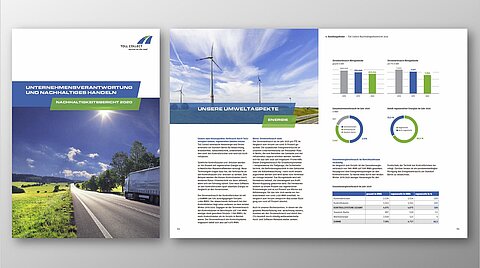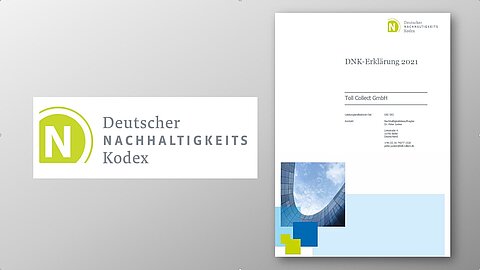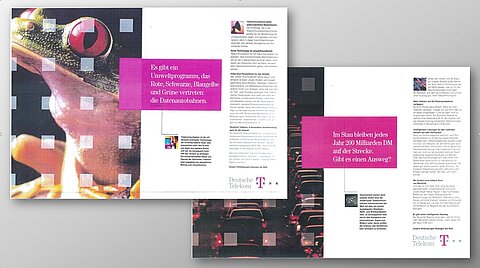Sustainability communication: Show and prove your strategy and successes
What is sustainability? What does sustainable management mean?
According to the common definition, sustainability is "the principle according to which no more may be consumed than can grow back, regenerate, be made available again in the future".
Sustainability is not limited to "ecology/environmental protection". Equal-ranking fields are "economy/governance" and "social issues/society". This results in a system of sustainable development with the three components "ecological", "social" and "economic" (the so-called triple bottom line), the intersection of which is referred to as "sustainable".
Internationally, this triad has come to be known as "environmental," "social" and "governance" - or "ESG" for short. Governance stands for good corporate management, which also covers the "economy" part.
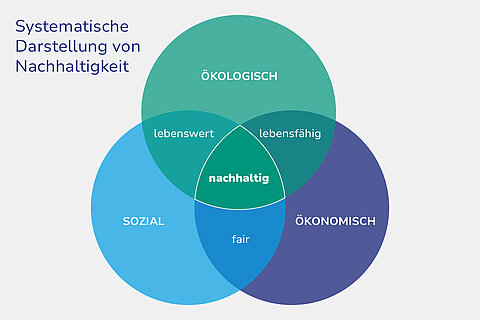
Three areas of responsibility, one goal: Holistic sustainability
For companies, sustainable management means looking at all three fields at the same time, getting to know the respective interest and stakeholder groups well and making their attitudes, wishes and demands the basis of the sustainability strategy.
Who the stakeholders are in the three areas of responsibility:
- The "Economy" area is about companies' customers, on the one hand, but also about suppliers and partners. And about the responsibility of companies for their products and services along the entire supply and value chain.
- In the "Social" area, the focus is on employees. The topics here are "attractiveness as an employer, occupational safety, personal development, work-life balance, equal opportunities and inclusion, interesting tasks and secure jobs for the future". It also deals with responsibility in the company's social environment (corporate social responsibility).
- In the area of "ecology/environmental protection" the aim is to organize the company's activities in harmony with the environment. In other words, increasing resource efficiency through process improvements and new technologies, constantly improving the "ecological footprint" created by business activities, and ultimately achieving the goal of CO2 neutrality.
The basis of a company's sustainability concept is the materiality analysis. This means: Together with the identified stakeholders, the key sustainability issues in the three areas described above are determined and made the guiding principles of the sustainability strategy. It is important to look at all sustainability parameters from two directions in each case: Once, how the company affects the environment (inside-out perspective) and once, what affects the company from the outside (outside-in perspective).
What is sustainability reporting?

Sustainability reporting means the publication of non-financial information relevant to stakeholders or other organizations – in the form of a sustainability report. This is a further development of the environmental reports or environmental statements that companies and public institutions developed in the 1990s – with the aim of presenting their activities and performance with regard to environmentally compatible development.
Various norms and standards have become established with regard to the structure, content and style of sustainability reports. Many are based on the rules of the Global Reporting Initiative (GRI), the ten principles of the UN Global Compact and the 17 Sustainable Development Goals (SDGs) of the United Nations, as well as ISO 26000. Other possible standards are the Gemeinwohl-Bilanz of the Initiative Gemeinwohl-Ökonomie, the Eco-Management and Audit Scheme of the European Union (EMAS III) and, for companies in Germany, the German Sustainability Code (DNK).
While a print edition used to be the standard, companies today often produce sustainability reports as mixed forms of print/PDF and online editions or as a pure online report (micro site), which offers many advantages in terms of linking options and interactive features.
The sustainability report as a central instrument of corporate communications
Today, the sustainability report plays a major role in corporate communications. Alongside the annual report, it is a central part of the information policy of large companies, especially if they are capital market-oriented or listed on the stock exchange - or if they are public-sector companies that want to issue such a report for reasons of transparency. This is also due to legal obligations. The Corporate Social Responsibility Directive Implementation Act (CSR-RUG) has been in force in Germany since 2017. According to this, companies with more than 500 employees and total assets of more than €20 million or sales of more than €40 million must submit a "non-financial statement" in addition to or as part of the management report in the annual report.
Sustainability reporting is also becoming an increasingly important task for small and medium-sized enterprises (SMEs), which many decision-makers are tackling proactively. This is because, on the one hand, many SMEs work as suppliers for large corporations with reporting obligations, which in turn require their contractual partners to comply with and document ecological and social standards along the entire value chain. They therefore become indirectly subject to reporting requirements. And on the other hand, today's customers, partners, investors and future employees also expect smaller companies to have a sustainability strategy – and to communicate it accordingly.
The problem is that many SMEs are starting from scratch. They first have to create personnel capacities for the conception of a report and for data collection. For many of them, this also means recording the relevant key figures in the company in the first place. Nevertheless, there is a lot to be said for SMEs starting now with a compact sustainability report – to define goals, to train the relevant processes in the company and to generate and specify the necessary data. After all, making the decision to publish a report can be the crucially important starting point in establishing sustainability management. And there is not much time left. The EU's Corporate Sustainability Reporting Directive (CSRD) is coming.
CSRD 2025 – are you ready for the Europe-wide reporting obligation?
The EU's Corporate Sustainability Reporting Directive (CSRD), adopted in November 2022, will take sustainability reporting to a much higher level. The CSRD succeeds the Non-Financial Reporting Directive (NFRD), which has already applied to around 12,000 companies in the EU since 2014.
The EU is thus pursuing the goal of transforming the economy in the direction of sustainability. Cornerstones are: Reduce CO2 footprint, practice circular business, protect biodiversity and ecosystems, equal opportunities and respect human rights.
The CSRD regulations will drastically increase the number of companies subject to EU sustainability reporting requirements (in the future: European Sustainability Reporting Standards – ESRS): to around 49,000 companies in the EU. The type of reporting is changing, the required scope is being significantly expanded, including the inclusion of EU taxonomy data. What's more, voluntary disclosure of information will become mandatory disclosure, to be included in the management report – as part of the annual report. In addition, the data must be certified by independent third parties (inclusion in the auditors' report). The sustainability report is therefore now becoming a matter for the boss at the latest.
For large companies in Germany, the CSRD will apply from 2025 for the 2024 reporting year, and for small ones from 2027 for the 2026 reporting year. For those who have previously dealt with sustainability issues little or not at all, the new reporting requirements definitely represent a challenge. However, if handled correctly, they will also create new opportunities for both large and small companies.
Why sustainability communication is crucial for the competitiveness of companies
In the past, companies were perceived primarily as organizations that sought to maximize profits in the marketplace. The more interconnected the global economy became, the more environmental and social problems arose, and a change in values took place in global societies: Away from the image of the company as a pure profit machine, towards an understanding of companies as trustworthy, social, transparently acting players that take responsibility for the environment, for resources, for sustainable action – everywhere the company operates.
Today, sustainability as a holistic concept and sustainability reporting as an executive tool are of crucial importance for the competitiveness and future security of companies and organizations. There are many reasons for this.
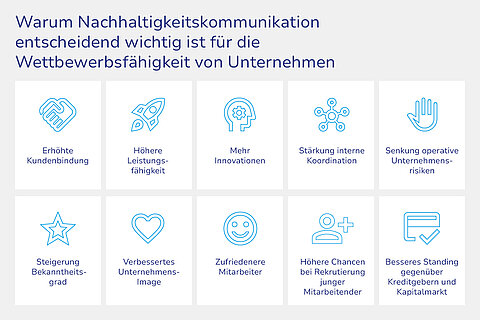
Why companies that act sustainably and communicate this well are more successful
A credible, comprehensible and well-told sustainability story ensures:
- Increased customer loyalty
- More and more customers prefer sustainable products and are also prepared to pay a higher price for them. At the same time, they avoid companies that do not score well in terms of sustainability. Sustainability is increasingly becoming a knock-out criterion in purchasing decisions, in B2C business as well as B2B. By addressing sustainability, companies demonstrate their future orientation and strengthen the trust of their customers.
- Higher economic performance, improved innovation:
- Resource efficiency, reduction of material and energy consumption, reuse and recycling can improve operational processes, generate cost savings and thus account for a better financial position of a company. Similarly, sustainable focus leads to retaining existing customers and attracting new customers in new markets (see "Customer Retention"), helping to maintain and grow sales and earnings.
- Strengthening internal corporate coordination, reducing operational corporate risks
- Reporting channels and cross-departmental coordination in the context of sustainability reporting improve the overarching flow of information. In this way, undesirable developments that could endanger the company as a whole are identified sooner, and risks that could threaten the company's existence are reduced.
- Increased awareness, improved corporate image:
- The presentation of a holistic sustainable orientation improves the visibility and transparency of a company to stakeholders: That is, customers, employees, future employees, suppliers, regulators, society. And it has become a prerequisite for companies to build trust and credibility for themselves and for their own products and services, and to promote corporate reputation.
- More satisfied employees
- Sustainable corporate governance and clearly defined values help to gain the trust and respect of employees and ensure strong identification with corporate goals. On the one hand, the "sustainability DNA" of a company is therefore an important topic of employee communication. On the other hand, it has become a unique selling point in the competition for talent and an element of employer branding. In addition, a sustainability report can make a significant contribution to establishing and advancing internal social and environmental management, especially in small and medium-sized companies. In this context, sustainability is also always an important topic of internal communication.
- Greater opportunities in recruiting young employees
- Generations Y (from 1980) and Z (from 1996) are key target groups for companies looking for new employees. As the consulting firm Deloitte showed in a study (Deloitte Millennial Survey 2020), these potential employees have a high awareness of sustainability, demand commitment from employers to climate protection and social justice in society. 43% of Generation Y say they will quit or turn down a job if it is not compatible with their values.
- Better standing vis-à-vis lenders and the capital market
- Lenders, investors, shareholders, asset managers, and rating agencies now include ESG and sustainability information when evaluating company performance and risk. They look closely at the extent to which industrial and commercial companies observe and practice relevant sustainability standards and whether they are future-proofed in this regard. If yes, this means better credit ratings, more favorable financing terms and long-term relationships with chapter providers. If not, this means an unfavorable position vis-à-vis competitors and, in the medium term, the existence of the company may be at risk.
What makes a good sustainability report – tips and checklist for decision-makers
Since 2009, the Institute for Ecological Economy Research (IÖW) together with the association future e.V. have been investigating and evaluating the sustainability reporting of large companies operating in Germany as well as small and medium-sized enterprises and compiling rankings, most recently for the reporting year 2021. The assessment criteria vary depending on the size of the company and the industry in which a company operates. But the same applies to all of them:
A good sustainability report is characterized firstly by "completeness in terms of material requirements" and secondly by "high general reporting quality.
"Completeness in the material requirements" means the report contains accordingly:
- Core sustainability performance indicators,
- Statement of the company's management,
- Profile of the company,
- Description of strategy and target development including materiality analysis and stakeholder engagement, and corporate vision for sustainable business,
- Description of the management systems (governance and compliance) with responsibilities and processes,
- Description of how the company assumes responsibility for its employees,
- Description of how ecological responsibility is exercised at the company's sites,
- Explanation of what the company is doing with regard to product stewardship and supply chain responsibility; and
- Presentation of the nature and extent of interaction with the social environment.
"High overall reporting quality" means:
- Credibility
- i.e. balance in the presentation of facts, openness in the information published, materiality of the main topics, involvement of external parties, high quality and topicality of the data provided and, last but not least, environmentally friendly way of producing the report.
- Informational value and comparability
- i.e. the report boundaries with regard to time periods and organization are correctly set and openly presented ("comply"), omissions - e.g. due to missing data - are stated and justified ("explain") and the measurability and comparability of the data is ensured by stating the control/calculation variables and standards as well as time series comparisons for the purpose of comparison with the targets.
- Communicative quality,
- i.e. clear structure, logical organization, in the case of PDF and online reports good navigability and menu navigation, targeted references to external sources of information as well as to the company's own sources (website, previous reports, etc.).
- This also includes an appealing design based on the company's corporate design as well as linking the content to the other important topics (purpose communication, story telling) and communication channels (integrated communication).
Sustainability reports: One in two has deficits in the "social" dimension
As the consulting firm KPMG has discovered, sustainability is increasingly becoming a priority for corporate decision-makers, but there are still shortcomings in sustainability reports, some of which are significant. In a recent study (Survey on Sustainability Reporting, twelfth edition 2022), KPMG examined the financial, ESG and sustainability reports of 5,800 companies in 58 countries. One of the results was that less than half report on social components.
This is precisely where working with an agency experienced in sustainability communications can help to highlight the relevant points. Also for the purpose of linking the sustainability report with the employer branding activities and the corporate social responsibility strategy and the internal HR and compliance topics.
Communicating sustainability the right way: How SpiessConsult can support you
- Development of basic concept for sustainability report (scope, content, focus, format)
- Support in the development of the sustainability strategy and the internal information of the employees about it
- Observation of the competition in your respective industry and deductions therefrom
- Briefing of the different areas of responsibility in the company for the purpose of data collection
- Conducting workshops for data/fact collection and taking minutes
- Preparation of all text contents
- Support throughout all stages of coordination of the report within the company
- Design structure and/or programming of the sustainability report
- Linking with other communication content and formats (website, annual report, etc.) as part of corporate communications.

Sustainability is an important topic for you? Do you want to design and publish a sustainability report or a DNK statement? And be prepared for the CSRD?
Let's talk about it. Together we will find sustainable communication solutions for small companies, for large companies – and for you.
